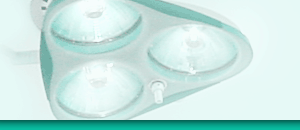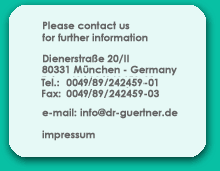Dear Patient,
ambulatory surgery is possible
and safe for many surgical interventions.
History, physical and personal interview are very important
to find out about your problem and the best way to deal
with it.
We feel you should
know there is no difference between surgery and anaesthesia
in general, whether it is done in an ambulatory centre or
in a hospital. Special care and attention must be provided
in ambulatory surgery, since you should have no extra risk
just because of ambulatory treatment.
Therefore we have
developed a check list to be completed by you before scheduling
surgery. Any surgery is risky. Planning and dealing with
problems in advance helps reduce the risk. We want to see
you in person at least one day, better two days prior to
surgery. History and physical, lab-reports, EKG, test of
pulmonary function, etc. are prerequisites of surgery. This
has to be organized and the investigations have to be reliably
done. For special indications we may need more studies like:
ultrasound, x-ray, MRI (magnetic resonance imaging) or CT
(computer tomography).
Hygiene is very
important to us. We still expect you to shower and shave
hair at the operative site before surgery as instructed.
Although infections are very rare in ambulatory surgery
in comparison to clinical surgery, we do have the concept
of antibiotic prophylaxis in every patient. With this treatment
fortunately MRSA (methacillin resistant staphylococcus aureus)
has not become a problem to us.
After surgery you
are in recovery for 4-6 hours to monitor your vital functions.
Of course, we care about effective pain-treatment. You will
be able to leave in stable condition. In the evening both
surgeon and anaesthesiologist will call or visit You to
make sure everything is fine.
The day after surgery
we want to see You at our office for a check up and wound
redressing. Please do not shower or bathe before the 3 rd
day after surgery, because water may contaminate the wound
and cause infection. Suture removal is recommended after
12 to 14 days after surgery.




